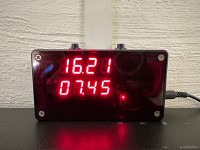Cloc - Alarm Clock 2.0

The alarm clock you've always dreamed of!
Cloc is an original alarm clock. Developed around an ESP32 module, it has functions not found in a commercial product:
- Automatic time setting from NTP server thanks to integrated Wi-Fi.
- Fully configurable by an integrated web server (PC, IOS, Android compatible ...).
- Time and alarm display on two separate displays. Seconds are indicated by flashing the digital point of the time display. The alarm has several display modes (off, fixed, flashing when the alarm is activated).
- Different alarms for each day of the week
- Integrated beep reproducing the sound of a classic electronic alarm clock
- IR transmission and reception to turn on and select a song from your playlist or your favorite radio station as an alarm. Simply place Cloc near your hi-fi system or your multimedia player.
- Two buttons only (Stop and Disable alarm)
- Display brightness as function of time is programmable from the HTML interface
- Updates of the firmware and the embedded WEB server can be done remotely in OTA mode.
This project is scheduled for publication in the March/April edition of Elektor Magazine. The article will, of course, include the schematic (and lots of explanations).
To be continued...
--------------------------------------------------- En français -----------------------------------------------------------------------
Cloc est un réveil original, car développé autour d'un module ESP32, il intègre des fonctionnalités qu'on ne trouve pas dans un produit du commerce:
- Mise à l'heure automatique grâce à la connexion WiFi intégrée par serveur NTP.
- Entièrement paramétrable par un serveur Web intégré (compatible PC, IOS, Androïd ...).
- Affichage de l'heure et de l'alarme sur 2 afficheurs distincts. La seconde est visualisée par le clignotement du point pour le temps. L'alarme a plusieurs types d'affichage (éteint, fixe clignotant lorsque l'alarme s'active).
- Programmation d' alarmes différentes pour chaque jour de la semaine
- Beep intégré reproduisant le son d'un réveil électronique classique
- Et surtout capteurs IR (émission et réception) intégrés au design et permettant d'allumer et de sélectionner un morceau de sa playlist ou bien sa station de radio préférée en guise de sonnerie d'alarme. Il suffit de poser Cloc près de sa chaine hifi ou de son lecteur multimédia.
- 2 boutons seulement ( Stop alarm et Disable alarm)
- L'a luminosité est réglable selon un créneau horaire qu'on peut programmer depuis l'interface HTML
- La mise à jour du firmware et du serveur WEB embarqué peuvent se faire à distance en mode OTA.
Le projet fera l'objet d'une publication dans le numéro de Mars/Avril du magazine Elektor. Bien entendu l'article publiera le schéma et de nombreuses explications sur le logiciel et le fonctionnement de Cloc 2.0 !
à suivre donc .....
- Automatic time setting from NTP server thanks to integrated Wi-Fi.
- Fully configurable by an integrated web server (PC, IOS, Android compatible ...).
- Time and alarm display on two separate displays. Seconds are indicated by flashing the digital point of the time display. The alarm has several display modes (off, fixed, flashing when the alarm is activated).
- Different alarms for each day of the week
- Integrated beep reproducing the sound of a classic electronic alarm clock
- IR transmission and reception to turn on and select a song from your playlist or your favorite radio station as an alarm. Simply place Cloc near your hi-fi system or your multimedia player.
- Two buttons only (Stop and Disable alarm)
- Display brightness as function of time is programmable from the HTML interface
- Updates of the firmware and the embedded WEB server can be done remotely in OTA mode.
This project is scheduled for publication in the March/April edition of Elektor Magazine. The article will, of course, include the schematic (and lots of explanations).
To be continued...
--------------------------------------------------- En français -----------------------------------------------------------------------
Cloc est un réveil original, car développé autour d'un module ESP32, il intègre des fonctionnalités qu'on ne trouve pas dans un produit du commerce:
- Mise à l'heure automatique grâce à la connexion WiFi intégrée par serveur NTP.
- Entièrement paramétrable par un serveur Web intégré (compatible PC, IOS, Androïd ...).
- Affichage de l'heure et de l'alarme sur 2 afficheurs distincts. La seconde est visualisée par le clignotement du point pour le temps. L'alarme a plusieurs types d'affichage (éteint, fixe clignotant lorsque l'alarme s'active).
- Programmation d' alarmes différentes pour chaque jour de la semaine
- Beep intégré reproduisant le son d'un réveil électronique classique
- Et surtout capteurs IR (émission et réception) intégrés au design et permettant d'allumer et de sélectionner un morceau de sa playlist ou bien sa station de radio préférée en guise de sonnerie d'alarme. Il suffit de poser Cloc près de sa chaine hifi ou de son lecteur multimédia.
- 2 boutons seulement ( Stop alarm et Disable alarm)
- L'a luminosité est réglable selon un créneau horaire qu'on peut programmer depuis l'interface HTML
- La mise à jour du firmware et du serveur WEB embarqué peuvent se faire à distance en mode OTA.
Le projet fera l'objet d'une publication dans le numéro de Mars/Avril du magazine Elektor. Bien entendu l'article publiera le schéma et de nombreuses explications sur le logiciel et le fonctionnement de Cloc 2.0 !
à suivre donc .....



Updates from the author